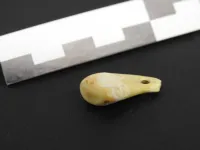(Press-News.org) New research highlights potential safety concerns around women taking romosozumab, a new anti-osteoporosis drug available on the NHS. The University of Bristol-led study, published in Arthritis & Rheumatology, analysed genetic data on nearly 34,000 people.
Despite romosozumab being particularly effective at reducing the risk of fracture in women with severe osteoporosis, potential safety concerns following trial data suggest the drug may cause an increased risk of heart attack. However, subsequent research has produced conflicting results.
An international team, led by Bristol Medical School researchers, sought to investigate whether, having a genetic tendency towards lower circulating levels of sclerostin — a protein expressed from bone cells which inhibits bone formation— may increase the risk of heart attack. They propose that this mimics the effect of giving the drug romosozumab, which acts to stimulate bone formation and increase bone density by blocking sclerostin.
Jon Tobias, Professor of Rheumatology at Bristol Medical School: Translational Health Sciences at the University of Bristol, and one of the study’s lead authors, explained: “Osteoporosis commonly affects older people, particularly women, where bones become weaker and more liable to fracture. Romosozumab is a new type of drug that is highly effective at treating this condition by blocking the protein sclerostin, which is produced by bone cells and negatively impacts bone density. Administered as monthly injections, the drug helps to increase bone density and lower fracture risk.
“We wanted to predict whether romosozumab’s action in blocking sclerostin might lead to an increased risk of heart attack, by examining effects of a genetic tendency to lower levels of sclerostin, on the basis that this might reproduce some of the effects of administering the drug.”
The team applied a scientific technique called Mendelian randomisation. This approach, which uses genetic variants as proxies for a particular risk factor, established whether having a genetic tendency to lower levels of sclerostin in the circulation increases a person’s risk of 15 diseases and risk factors related to atherosclerosis (hardening of the arteries). These included, heart attack, stroke, type 2 diabetes and high blood pressure.
Using genetic data on 33,961 European individuals, the team identified several genetic variants associated with lower levels of sclerostin. Their analyses suggested that lowering sclerostin levels might lead to a 30 per cent increased risk of heart attack, as well as an increased risk of calcification of the arteries of the heart, hypertension and type 2 diabetes, whereas no effect was seen on stroke risk. A genetic predisposition to lower sclerostin also led to lipid profiles that were more likely to cause atherosclerosis.
Professor Jon Tobias added: “Our findings suggest that individuals genetically predisposed to lower circulating levels of sclerostin have an increased risk of cardiovascular events, reinforcing the need for strategies to minimise any potential impact of treatment with sclerostin inhibitors on heart attack risk, some of which are already in place, such as avoidance in patients with previous cardiovascular problems.”
The research was supported by the University of Bristol’s Avon Longitudinal Study of Parents and Children (ALSPAC) and MRC Integrative Epidemiology Unit (IEU).
END
Study provides genetic evidence on new osteoporosis drug heart attack risk
Study analyzed genetic data on nearly 34,000 people
2023-05-03
ELSE PRESS RELEASES FROM THIS DATE:
OSU research shows how hackers can target smart meters to destabilize electricity grid
2023-05-03
CORVALLIS, Ore. – A power transmission grid can be destabilized by hackers who manipulate smart meters to create an oscillation in electricity demand, researchers in the Oregon State University College of Engineering have shown.
Findings were published in IEEE Access.
The study is important because understanding where a grid’s vulnerabilities lie and what they look like is the first step in designing protection mechanisms, says associate professor of electrical engineering and computer science Eduardo Cotilla-Sanchez, who led the project with graduate student Falah Alanazi.
A ...
New catalyst transforms carbon dioxide into sustainable byproduct
2023-05-03
The need to capture CO2 and transport it for permanent storage or conversion into valued end uses is a national priority recently identified in the Bipartisan Infrastructure Law to move toward net-zero greenhouse gas emissions by 2050.
Now, Northwestern University researchers have worked with an international team of collaborators to create acetic acid out of carbon monoxide derived from captured carbon. The innovation, which uses a novel catalyst created in the lab of professor Ted Sargent, could spur new interest in carbon capture and storage.
“Carbon capture is feasible today from a technical point of view, but not yet from an economic point ...
Virtual consulting can significantly cut carbon footprint in health care, new study suggests
2023-05-03
Virtual consulting is a new and emerging contributor to environmentally sustainable health care, according to findings of new research published in the Journal of Medical Internet Research.
The COVID-19 pandemic has accelerated the shift to virtual consulting, leading to its growing use. As health systems across the world strive to achieve net-zero carbon emissions, a critical question arises: what is the impact of virtual consulting on environmental sustainability in health care? A new research study led by Sara Shaw and team aims to address this ...
USC Verdugo Hills Hospital nationally recognized with first ‘A’ hospital safety grade
2023-05-03
LOS ANGELES — For the first time, USC Verdugo Hills Hospital (USC-VHH) earned an “A” Hospital Safety Grade from The Leapfrog Group, an independent national watchdog organization, for achieving the highest national standards in patient safety. This achievement places USC-VHH among top tier hospitals in the nation for safety and quality.
“Our entire staff is dedicated to improving and upholding the highest standards of patient care,” said Mary Virgallito, MSN, RN, chief quality officer at USC-VHH. “This score reinforces our ...
In a first, astronomers spot a star swallowing a planet
2023-05-03
As a star runs out of fuel, it will billow out to a million times its original size, engulfing any matter — and planets — in its wake. Scientists have observed hints of stars just before, and shortly after, the act of consuming entire planets, but they have never caught one in the act until now.
In a study that will appear in Nature, scientists at MIT, Harvard University, Caltech, and elsewhere report that they have observed a star swallowing a planet, for the first time.
The ...
Traces from the past
2023-05-03
Artefacts made of stone, bones or teeth provide important insights into the subsistence strategies of early humans, their behavior and culture. However, until now it has been difficult to attribute these artefacts to specific individuals, since burials and grave goods were very rare in the Palaeolithic. This has limited the possibilities of drawing conclusions about, for example, division of labor or the social roles of individuals during this period.
In order to directly link cultural objects to specific individuals and thus gain deeper insights into Paleolithic ...
New tusk-analysis techniques reveal surging testosterone in male woolly mammoths
2023-05-03
Graphics // Video
Traces of sex hormones extracted from a woolly mammoth's tusk provide the first direct evidence that adult males experienced musth, a testosterone-driven episode of heightened aggression against rival males, according to a new University of Michigan-led study.
In male elephants, elevated testosterone during musth was previously recognized from blood and urine tests. Musth battles in extinct relatives of modern elephants have been inferred from skeletal injuries, broken tusk tips and other indirect lines of evidence.
But the new study, scheduled ...
Evaluation of Waning of SARS-CoV-2 Vaccine–Induced Immunity
2023-05-03
About The Study: The findings of this systematic review and meta-analysis of secondary data from 40 studies suggest that the effectiveness of COVID-19 vaccines against laboratory-confirmed Omicron or Delta infection and symptomatic disease rapidly wanes over time after the primary vaccination cycle and booster dose. These results can inform the design of appropriate targets and timing for future vaccination programs.
Authors: Piero Poletti, Ph.D., of the Bruno Kessler Foundation in Trento, Italy, is the corresponding author.
To access the embargoed study: Visit our For The Media website at this ...
Researchers capture elusive missing step in the final act of photosynthesis
2023-05-03
Menlo Park, Calif. – Photosynthesis plays a crucial role in shaping and sustaining life on Earth, yet many aspects of the process remain a mystery. One such mystery is how Photosystem II, a protein complex in plants, algae and cyanobacteria, harvests energy from sunlight and uses it to split water, producing the oxygen we breathe. Now researchers from the Department of Energy’s Lawrence Berkeley National Laboratory and SLAC National Accelerator Laboratory, together with collaborators from Uppsala University and Humboldt University and other institutions have succeeded in cracking a key secret of Photosystem II.
Using SLAC’s Linac Coherent Light ...
Association between depression and physical conditions requiring hospitalization
2023-05-03
About The Study: In this study that included 240,000 individuals, the most common causes of hospitalization in people with depression were endocrine, musculoskeletal, and vascular diseases, not psychiatric disorders. These findings suggest that depression should be considered as a target for the prevention of physical and mental disease.
Authors: Philipp Frank, Ph.D., of University College London, is the corresponding author.
To access the embargoed study: Visit our For The Media website at this link https://media.jamanetwork.com/
(10.1001/jamapsychiatry.2023.0777)
Editor’s ...
LAST 30 PRESS RELEASES:
Pollen exposure linked to poorer exam results taken at the end of secondary school
7 hours 18 mins may be optimal sleep length for avoiding type 2 diabetes precursor
Around 6 deaths a year linked to clubbing in the UK
Children’s development set back years by Covid lockdowns, study reveals
Four decades of data give unique insight into the Sun’s inner life
Urban trees can absorb more CO₂ than cars emit during summer
Fund for Science and Technology awards $15 million to Scripps Oceanography
New NIH grant advances Lupus protein research
New farm-scale biochar system could cut agricultural emissions by 75 percent while removing carbon from the atmosphere
From herbal waste to high performance clean water material: Turning traditional medicine residues into powerful biochar
New sulfur-iron biochar shows powerful ability to lock up arsenic and cadmium in contaminated soils
AI-driven chart review accurately identifies potential rare disease trial participants in new study
Paleontologist Stephen Chester and colleagues reveal new clues about early primate evolution
UF research finds a gentler way to treat aggressive gum disease
Strong alcohol policy could reduce cancer in Canada
Air pollution from wildfires linked to higher rate of stroke
Tiny flows, big insights: microfluidics system boosts super-resolution microscopy
Pennington Biomedical researcher publishes editorial in leading American Heart Association journal
New tool reveals the secrets of HIV-infected cells
HMH scientists calculate breathing-brain wave rhythms in deepest sleep
Electron microscopy shows ‘mouse bite’ defects in semiconductors
Ochsner Children's CEO joins Make-A-Wish Board
Research spotlight: Exploring the neural basis of visual imagination
Wildlife imaging shows that AI models aren’t as smart as we think
Prolonged drought linked to instability in key nitrogen-cycling microbes in Connecticut salt marsh
Self-cleaning fuel cells? Researchers reveal steam-powered fix for ‘sulfur poisoning’
Bacteria found in mouth and gut may help protect against severe peanut allergic reactions
Ultra-processed foods in preschool years associated with behavioural difficulties in childhood
A fanged frog long thought to be one species is revealing itself to be several
Weill Cornell Medicine selected for Prostate Cancer Foundation Challenge Award
[Press-News.org] Study provides genetic evidence on new osteoporosis drug heart attack riskStudy analyzed genetic data on nearly 34,000 people



